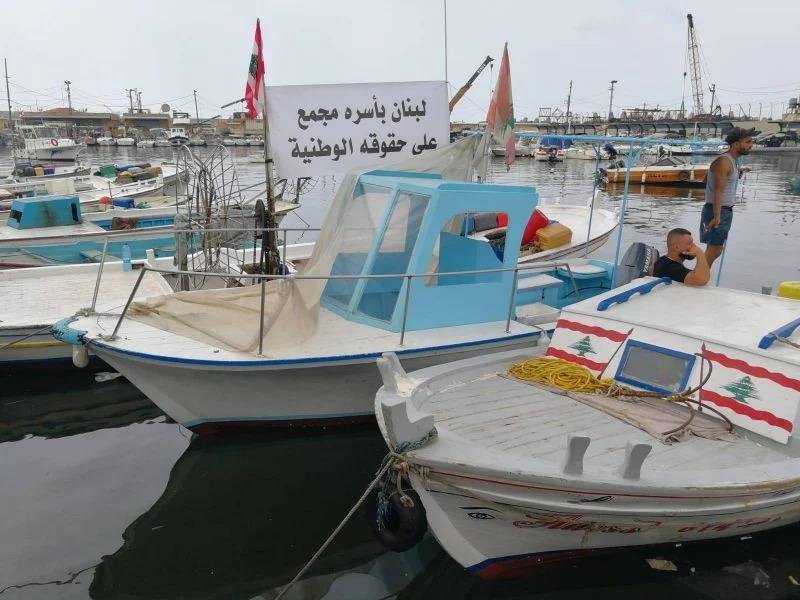
Boats prepare to set out from Saida on Sunday, with a sign declaring Lebanon's right to its offshore gas wealth. (Courtesy L'Orient Today correspondent Mountasser Abdallah)
BEIRUT — As tension has flared between Israel and Hezbollah over the disputed Karish gas field, citizens in Lebanon are finding themselves in the emotional turmoil that “every Lebanese goes through every single summer since the 2006 war,” Aya Hamieh, 33-year-old mother of two told L’Orient Today as she was stocking up on medicine in the southern suburbs of Beirut in case of an “escalation.”
While analysts have downplayed the potential for a new military conflict, escalation fears spread amongst citizens after local media reported that the American envoy Amos Hochstein is expected in Beirut on Sept. 7 to convey to the authorities the Israeli response to Lebanese claims on the maritime border.
Meanwhile, Israeli military exercises began Sunday at the border between Lebanon and Israel and will continue until Tuesday evening, Arabic-speaking Israeli army spokesman Avichay Adraee said in a tweet.
“During these exercises, movements of military vehicles will be observed and detonations may be heard in the area,” Adraee warned, continuing that the “exercise is part of the 2022 annual maneuvers plan.”
The Israeli maneuvers come at a time of increasing tensions over the maritime border. Hezbollah leader Hassan Nasrallah has warned, “if the [Israeli] extraction of oil and gas starts in September before Lebanon gets its rights, we are going to a fight and have set a goal and we will act accordingly.”
Some anxious citizens in Lebanon have resorted to panic buying medication, and food supplies — primarily canned food due to their long shelf-life — while others told L’Orient Today that they were planning on leaving the country altogether.
Firas Habshi, a 50-year-old supermarket owner in the southern suburbs of Beirut said that he has some savings, a couple of bags of canned food, and a few belongings prepared in a bag that has been by his house’s door since Israel deployed a floating production ship to the Karish gas field on June 5, located in the disputed waters between Lebanon and Israel.
“My sister had planned to come to Lebanon this September from Qatar, but she canceled her trip after Nasrallah’s threats,” Ayla Dahdouh, a 39-year-old schoolteacher told L’Orient Today on the bustling main street in Beirut’s Hamra district.
Dahdouh said she doesn’t have a doubt in mind that a war would take place soon.
“Hochstein is obviously not on our side, and Israel won’t bow down to Hezbollah, so war it is,” she said, adding that she had convinced her sister, who lives abroad, to not come and spend her time in the country in “a makeshift bomb shelter, like we spent our childhood.”
Hochstein was born and raised in Israel to American parents and served in the Israeli army.
Dahdouh added that it “is quite funny that Hezbollah claims that they won’t allow Israelis to step in Lebanon whereas Hochstein had served in the Israeli army.”
Some said they are planning to leave the country, at least temporarily, in anticipation of a conflict as Hochstein’s visit looms, because they are expecting it to bring bad news.
Sixty-five-year-old Nazha Suheir from Beirut told L’Orient Today that she believes that war is “only a couple of weeks, if not days away. I still remember how it was in the 2006 war. We went to bed thinking that the worst was over and that Israel and Hezbollah were simply exchanging their usual threats, and woke up to a full-scale war.”
Suheir will be leaving tomorrow to stay with her son in Dubai “until things calm down,” adding that she has seen enough in her life in Lebanon and can’t take any more “misery.”
Randa Slim, director of the Conflict Resolution and Track II Dialogues Program at the Middle East Institute, told L’Orient Today that both “Lebanon and Israel don’t want war, and the groundwork is set for a solution that serves the interest for both sides, but it needs a political will, and requires concession from both sides.”
Slim added that both Lebanon and Israel are interested in maintaining the current status quo, since the situation both domestically and geopolitically cannot tolerate war.
However, both sides have engaged in bellicose rhetoric.
“We will reach Karish and everything beyond Karish and everything beyond that,” Nasrallah said in a televised speech on July 13. “War is much more honorable than the situation Lebanon is heading to now — collapse and starvation.”
On Sunday, a number of boats set out from the port of Tripoli in the north, and Saida and Sour in the south, towards Naqoura, close to the Lebanese border with Israel on Sunday, to express the “right of the Lebanese to water and offshore gas wealth,” under the slogan “Lebanon’s oil is for Lebanon.”
Ayman Hamdan is a 29-year-old unemployed civil-engineering graduate who lives in Tripoli. He was one of the activists on the boat heading from Tripoli to Saida, and said that though he believes “Israel is too afraid of Hezbollah to launch a war, we all need to come together as Lebanese to express that our national wealth is ours and is not for Israel to loot.”
On the other hand, Hana Khoury, a 27-year-old freelance graphic designer residing in Ain al-Rummaneh just south of Beirut, said she believes that Hezbollah is “lunatic enough to drag Lebanon into a war that it can’t afford.”
Khoury stated that Israelis have advanced bomb shelters to protect them in case of war, whereas the Lebanese have nothing.
“I won’t even be able to leave my house if a war breaks out, and seek refuge elsewhere as I’ve been semi-unemployed since October 2020 and live on a day-to-day basis.”
Nasrallah had said in June that his party would not partake in the negotiations over the disputed maritime boundaries with Israel yet would not stand idle “before the looting of Lebanon's wealth,” adding that Hezbollah “does not want a war, yet is not afraid of one.”
In July, The Israeli Minister of Energy, Karin Elharrar, confirmed during her visit to the Karish field that gas will be extracted in September.
However, some Lebanese are greeting the confrontational rhetoric with a shrug. An 89-year-old retired army member, Sami Dalloul, assured that “nothing major will happen. They’ll exchange some heavy-sounding threats and that will be it. It’s been happening for years, I won’t fall for it.”

